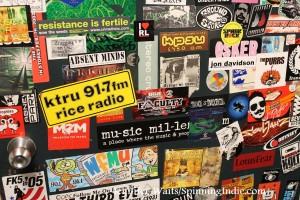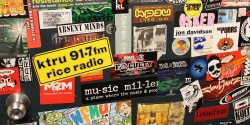 I begin this week’s installment of College Radio Survivor with the great news that many colleges and universities took advantage of the recently opened LPFM window and applied for new LPFM licenses. I’m still sifting through the data (there were nearly 3,000 total applicants), but I was thrilled to see that several college radio stations that lost access to terrestrial broadcasting are among the new applicants. In fact, the new LPFM filings are a welcome addendum to some of the terrestrial losses of 2011.
I begin this week’s installment of College Radio Survivor with the great news that many colleges and universities took advantage of the recently opened LPFM window and applied for new LPFM licenses. I’m still sifting through the data (there were nearly 3,000 total applicants), but I was thrilled to see that several college radio stations that lost access to terrestrial broadcasting are among the new applicants. In fact, the new LPFM filings are a welcome addendum to some of the terrestrial losses of 2011.
Some of the colleges and universities that applied for new LPFM licenses include Reed College (its online station KRRC had a terrestrial license until 2012, when it donated its license to Common Frequency), Rice University (in 2011 the university sold the KTRU FM license to University of Houston), Portland State University (KPSU used to broadcast on AM due to an arrangement with a local school. That deal ended in 2010.), and Bryant University (the school entered into a deal in 2011 to allow WGBH to broadcast over Bryant’s WJFM FM signal). Additionally, the student organization Brown Student Radio (BSR) is applying for a new LPFM license, following the loss of its FM time-share arrangement with the Wheeler School in 2011.
Additionally, there are a few applicants who are a direct outgrowth of the loss of terrestrial radio at University of San Francisco’s KUSF and Vanderbilt University’s WRVU. San Francisco Community Radio, which has been operating the online station KUSF-in-Exile submitted an application for San Francisco. In Nashville, WRVU Friends and Family (which has been fighting the pending sale of WRVU) applied for a LPFM signal as well.
It really warms my heart to see this long list of formerly terrestrial stations taking the initiative to get back on the air. Additionally, many other colleges and universities are applying (my preliminary estimate is around 100 college-affiliated applicants), even if they didn’t have a terrestrial station previously. The one university applicant that I’ve found in my city of San Francisco is the California Institute of Integral Studies. Additionally, in the Bay Area, there’s an application from Peralta Community College District in Oakland. A bit further outside the Bay Area, there’s also an application in from San Joaquin Delta Community College District in Stockton and an application from California State University Monterey Bay in Seaside.
Some of the other applicants include, but are not limited to, Johns Hopkins University, Loyola University-Maryland, University of Texas at Dallas, Indiana University, South Carolina State University, University of Washington Bothell, Kentucky State, Kutztown University, Barry University, University of Hawaii at Hilo, University of Central Oklahoma, University of Oklahoma, Carroll University, St. Cloud State University, Humboldt State University, University of Virginia, University of North Florida, West Virginia University at Parkersburg Journalism Department, University of Southern Mississippi Gulf Coast, Northern Arizona University, Seattle University, Regis University, Bastyr University Radio Club, Colorado Mountain College, Holy Cross College (South Bend, IN), Atlantic Cape Community College, St. Michael’s College (Vermont), Central Oregon Community College, Monmouth College, Sweet Briar College, SUNY College at Oneonta, and Wheaton College (Massachusetts).
In the coming weeks, I hope to dig into the data in order to provide a greater sense of just how many college radio applicants there were, as this list just scratches the surface. My initial estimate of 100 college-affiliated applicants is based on a quick analysis of the data and it’s possible there are more stations. Additionally, it will be helpful to take a look at what sort of competition these potential licensees are facing.
In other college radio news, see my recap of the University of California Radio Network conference held at KUCI over the weekend, read about how the anniversary of President John F. Kennedy’s assassination called up some college radio memories, and learn more about the launch of a new You Tube channel by North Carolina State’s college radio station.
We cover the culture of college radio every Friday in our College Radio Survivor feature.



